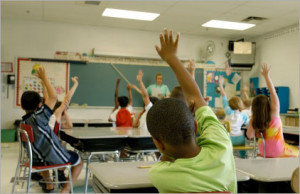>> The latest data from the >>Annie E. Casey Foundation’s Kids Count report documents the results of decisions made by North Carolina’s leaders to underfund schools and >>underpay public school teachers.
The latest data from the >>Annie E. Casey Foundation’s Kids Count report documents the results of decisions made by North Carolina’s leaders to underfund schools and >>underpay public school teachers.
Kids Count pulls data from multiple sources to provide a picture of how children in each state are faring. Looking at the education data, it’s clear the situation for North Carolina students is grim.
Two-thirds of fourth graders scored below proficiency level in reading on the >>National Assessment of Education Progress, the largest nationally educational assessment in the United States. Furthermore, 68% and 56% of fourth graders scored below proficiency in writing and math, respectively.
This puts North Carolina in the middle of the pack nationally and way behind its neighbors to the north; students in Maryland and the New England states performed much better.
The vast majority of students in North Carolina who scored “not proficient” in reading came from low-income households. In 2011, >>81% of those students were eligible for free or reduced-price school lunch. That means they lived in households with incomes 185% below the federal poverty level; generally, anything below 200% of the federal poverty level is considered low-income.
The correlations between education and family economics are too strong to ignore. According to Kids Count’s 2011 data, >>50% of all children in North Carolina lived in low-income households – up from 43% in 2007. >>Half of those children were members of a low-income working family, which in this study means that at least one parent in the household worked 50 or more weeks during the previous year, but they still made too little to make ends meet.
And life is getting harder for these families. The legislature’s decision to cut off unemployment benefits for people facing long-term joblessness means tens of thousands of families with children have lost the one thing that was helping them keep their heads above water.
This includes families like that of Jennifer Campbell of Kannapolis, NC, who lost her job in December and then lost her extended benefits when Governor McCrory signed the bill cutting them off. She and her husband have three children. >>According to an article in the Raleigh News & Observer, “The family gets by on the $350 a week her husband makes at his commercial air duct fabricating job, but the loss of her income forced them to sell their house and move in with her husband’s grandfather.”
There are stories like that in every county in North Carolina.
There are two important points to take away from this data. First, the economic situation and the choices made by state leaders mean schools will be seeing more students with greater needs. More students will be dealing with displacement, homelessness and hunger, and >>because state leaders also reduced the number of pre-kindergarten slots available for four-year olds from low-income families, more kindergarteners will be behind in their academic skills when they get to school. All of this means our public schools need more teachers, more specialists, more teacher assistants, and more resources.
And why should the money for these resources go to public schools and not >>private schools through vouchers? That’s the second point. The students most in need can’t benefit from private-school vouchers. First, of course, there’s the tuition, which often is only partially covered under voucher programs. But that’s not the only financial obstacle. If a private school doesn’t provide free lunch and free transportation, it’s not an option for a low-income family. Besides, >>there’s no proof that private schools provide low-income students with better education.
North Carolina can provide these kids with an education that will give them the opportunity to move into the middle class. It just needs leaders with the will to make it happen.
Of all the areas our state could cut funding, grades 1-12 is NOT the place!
To not reward teachers who have advanced degrees will discourage many who would have thought they would be compensated. Anyone in the education profession knows that the more we can learn, the more the children in the classroom will benefit academically.
Our governor and all the senators and congressmen from the state of North Carolina need to take another look at the statistics relative to the ranking of education in NC. Yes, a lot of children do come from impoverished families; all the more reason to make sure the necessary materials are in the classroom. Out-dated text books, or not enough text books, is not acceptable! Did our governor and the other representatives from our state go through grade school without text books? Not likely.
The state Education Lottery in NC was named this so our state could have a lottery, with the pretense of putting a lot of the revenue in our public schools. If this was truly the case, our schools, children, and teachers would not have the issues that have been passed down so recently by our state government.
It’s time North Carolina schools are given all the resources needed to provide every child a great education! Isn’t the role of public and private schools to prepare students to be productive members of society?
Aren’t we preparing them to be our future leaders?
It’s a travesty and our state government should rethink the consequences of the next election.